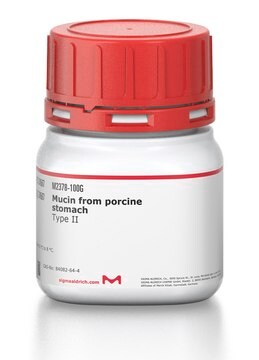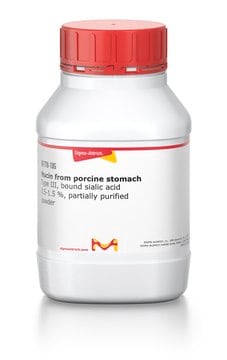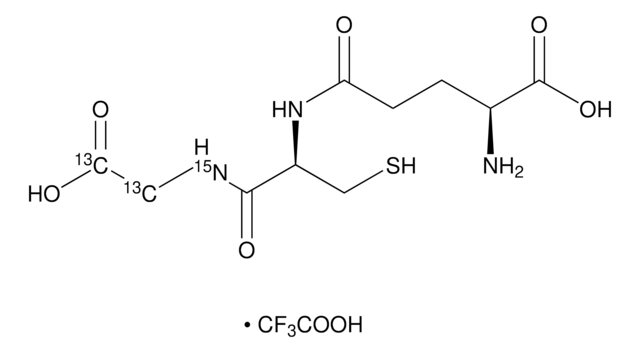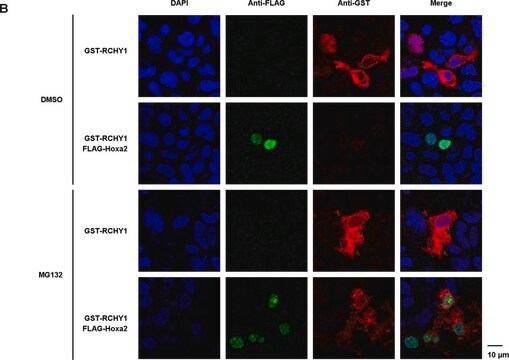G5017
Glycophorin Predominantly glycophorin A from blood type MN
lyophilized powder
Autenticatiper visualizzare i prezzi riservati alla tua organizzazione & contrattuali
About This Item
Prodotti consigliati
Origine biologica
human blood (type MN)
Livello qualitativo
Forma fisica
lyophilized powder
Solubilità
soluble 1.00-1.10 mg/mL
H2O: soluble, clear to hazy
N° accesso UniProt
Temperatura di conservazione
−20°C
Informazioni sul gene
human ... GYPA(2993)
Descrizione generale
Glycophorin (GYPA), a sialoglycoprotein, is present in human erythrocytes that carry antigens M and N of the MN blood group. The GYPA gene is mapped to human chromosome 4q31.21.
Glycophorin A cconsists of a glycosylated extracellular domain, a single transmembrane α-helix and a cytoplasmic COOH-terminal domain.
Applicazioni
Glycophorin A (GpA) is used as a model system for extensive experimental, theoretical, and simulation studies focusing on TM protein association. Glycophorin A is used to study the mechanism of kinase activation in the receptor for colony-stimulating factor 1. It is used to analyse glycoproteins separated by two-dimensional gel electrophoresis.
Glycophorin Predominantly glycophorin A from blood type MN has been used:
- as a standard in Amide-80 column size-based separation for the characterization of plasma-type O-linked sugar chains
- to screen the P. falciparum phage library using biopanning method,
- as a phosphocholine-free component to test its reactivity with antibodies over a saccharide-bound enzyme-linked immunosorbent assay (ELISA)
Azioni biochim/fisiol
Glycophorin (GYPA) is involved in the mode of entry of the Plasmodium falciparum parasite into erythrocytes. It is also implicated in intraplaque hemorrhage as well as in the macrophage infiltration in coronary atheromas.
A membrane glycoprotein with several isoforms that interact with other membrane proteins to confer shape and antigenicity to erythrocytes.
Esclusione di responsabilità
RESEARCH USE ONLY. This product is regulated in France when intended to be used for scientific purposes, including for import and export activities (Article L 1211-1 paragraph 2 of the Public Health Code). The purchaser (i.e. enduser) is required to obtain an import authorization from the France Ministry of Research referred in the Article L1245-5-1 II. of Public Health Code. By ordering this product, you are confirming that you have obtained the proper import authorization.
Codice della classe di stoccaggio
11 - Combustible Solids
Classe di pericolosità dell'acqua (WGK)
WGK 3
Punto d’infiammabilità (°F)
Not applicable
Punto d’infiammabilità (°C)
Not applicable
Certificati d'analisi (COA)
Cerca il Certificati d'analisi (COA) digitando il numero di lotto/batch corrispondente. I numeri di lotto o di batch sono stampati sull'etichetta dei prodotti dopo la parola ‘Lotto’ o ‘Batch’.
Possiedi già questo prodotto?
I documenti relativi ai prodotti acquistati recentemente sono disponibili nell’Archivio dei documenti.
Hajime Mizukami et al.
Journal of human genetics, 50(12), 667-670 (2005-10-06)
Ten alleles (five M and five N alleles) of the MN blood group system with normal antigenicity were found by sequencing the glycophorin A (GPA) gene. This study demonstrates the systematic classification of these alleles to major or minor variations
N H Packer et al.
Electrophoresis, 19(6), 981-988 (1998-06-25)
Two-dimensional (2-D) electrophoresis is the preferred method for separating the glycoforms of proteins. The isoforms usually present as 'trains' of spots in the first dimension and may also differ in molecular weight. The primary goal for analyzing the carbohydrate content
Alba Fernández-Sánchez et al.
Immunology letters, 123(2), 125-131 (2009-05-12)
The immunization of BALB/c mice with heat-killed cells of Streptococcus mitis SK598 allowed the rescue of mouse monoclonal antibodies (mAbs) reactive with the pneumococcal cell wall C-polysaccharide backbone. We report for the first time the genetic and molecular characterization of
Possible exacerbation of myasthenia gravis by ciprofloxacin.
B Moore et al.
Lancet (London, England), 1(8590), 882-882 (1988-04-16)
Xuerong Li et al.
Molecular and biochemical parasitology, 183(1), 23-31 (2012-01-26)
The malaria parasite Plasmodium falciparum invades human erythrocytes through multiple pathways utilizing several ligand-receptor interactions. These interactions are broadly classified in two groups according to their dependency on sialic acid residues. Here, we focus on the sialic acid-dependent pathway by
Il team dei nostri ricercatori vanta grande esperienza in tutte le aree della ricerca quali Life Science, scienza dei materiali, sintesi chimica, cromatografia, discipline analitiche, ecc..
Contatta l'Assistenza Tecnica.





